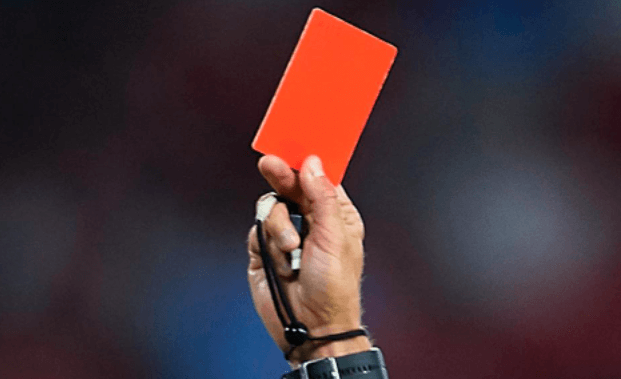What does a red card mean in soccer?

In soccer, a red card is used as a disciplinary measure to remove a player from the soccer field. The most common reasons for receiving a red card are serious foul play, violent conduct, spitting at an opponent or deliberately handling the ball to stop an opponent’s clear scoring opportunity.
A player who is sent off the field may not be replaced and is banned from playing in the team’s next match. So what exactly constitutes a red card offense? Let’s take a look at this in details.
The Meaning of a Red Card in Soccer
A red card in soccer is an official way of showing a player has been ejected from the game for breaking the rules. It is usually given out for more serious offenses than a yellow card, which is used for lesser offenses and more of a warning. Once a player receives a red card, they must leave the field and can no longer play in the game. The team they were playing on will also be down a player for the rest of the match.
There are a few different offenses that can result in a red card. One is if a player excessively uses foul language or gestures towards another player, referee, or fan. Another way a red card can be given is if a player is violent on the field, such as fighting with another player or elbowing them in the face.
A third way is if a player deliberately tries to stop a goal from being scored, like handling the ball on a clear goal-scoring opportunity for the other team. Finally, spitting at another player or fan is an offense that will always result in a red card.
It’s important to know what can get you a red card in soccer because once you’re ejected from the game, your team is at a disadvantage. They have to play the rest of the match with one less player, which makes it harder to win.
If you receive two yellow cards in one game, that also results in a red card. So if you’re getting close to receiving a yellow card, it’s best to tone down your play and avoid any further actions that could get you ejected from the game.
The 7 Offenses that lead to Red Card in Soccer
- Violent Conduct
One of the most common reasons for a red card is violent conduct on the field. This can include everything from fighting with another player to elbowing them in the face. If you’re getting too physical with another player or using too much force, the referee may deem it as violent conduct and show you a red card.
- Excessive Foul Language
Using excessive foul language is another offense that can get you a red card. This includes swearing at another player, referee, or fan. If you’re using too much profanity, the referee may give you a warning first. But if you continue to do it, they may show you a red card and eject you from the game.
- Spitting
Spitting at another player or fan is one of the most serious offenses in soccer and will always result in a red card. This is because it’s considered a form of assault and is taken very seriously by referees. If you spit at someone, you will be immediately ejected from the game and may even face further disciplinary action.
- Deliberately Handling the Ball
Deliberately handling the ball is another offense that can lead to a red card. This usually happens when a player tries to stop a clear goal-scoring opportunity for the other team. For example, if the other team is about to score and you kick the ball away, you’ll likely receive a red card.
- Refusing to Leave the Field
If you receive a red card, you must immediately leave the field and can no longer play in the game. If you refuse to do so, you may receive an additional red card and be banned from playing in your team’s next match.
- Receiving Two Yellow Cards
If you receive two yellow cards in one game, that also results in a red card. This is called a double yellow card and it’s usually given out for more minor offenses. For example, if you commit a foul and then argue with the referee, you may receive a double yellow card.
- Failing to Respect the Referee
Failing to respect the referee is another offense that can lead to a red card. This includes everything from arguing with them to not following their instructions. If you’re constantly arguing with the referee or failing to listen to them, they may show you a red card as a way of ejecting you from the game.
These are just some of the offenses that can lead to a red card in soccer. If you’re getting too physical with another player or using too much profanity, you may be at risk of being ejected from the game. It’s important to know the rules and respect the referee so you can avoid getting a red card.
FAQS
What are the rules for a red card in soccer?
There are 7 offenses that can lead to a red card in soccer: violent conduct, excessive foul language, spitting, deliberately handling the ball, refusing to leave the field, receiving two yellow cards, and failing to respect the referee.
How long does a red card in football last?
If you receive a red card in football, you must immediately leave the field and can no longer play in the game. Depending on the severity of the offense, you may also be banned from playing in your team’s next match.
What does each color card mean in soccer?
Yellow cards are given out as a warning and red cards are given out for more serious offenses. If you receive two yellow cards in one game, that also results in a red card.
How many games do you miss when you get a red card?
If you receive a red card, you must immediately leave the field and can no longer play in the game. Depending on the severity of the offense, you may also be banned from playing in your team’s next match.
Final words
Red cards in soccer can be a little confusing if you’re not familiar with the game. We hope this article has cleared up any confusion and answered your question: what does a red card mean in soccer? Have you ever seen a player receive a red card in a soccer match? What do you think about the offenses that warrant a red card? If you have any further questions, let us know in the comment section below!





